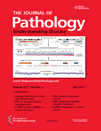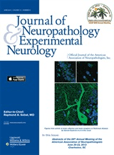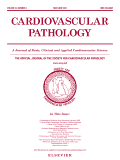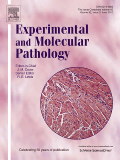
JOURNAL OF PATHOLOGY
Scope & Guideline
Fostering Discovery in the World of Pathology
Introduction
Aims and Scopes
- Molecular Pathology:
Research centered on the molecular mechanisms underlying diseases, including genetic alterations, epigenetic changes, and signaling pathways involved in disease progression. - Computational Pathology:
Utilization of machine learning and artificial intelligence to enhance diagnostic processes, including image analysis, classification of histopathological images, and predictive modeling. - Tissue Microenvironment Studies:
Exploration of the tumor microenvironment, including interactions between cancer cells and stromal components, and how these interactions influence tumor progression and response to therapy. - Pathogen-Host Interactions:
Investigations into how various pathogens, including viruses and bacteria, affect host cellular processes, contributing to disease pathogenesis. - Translational Research:
Research that bridges lab findings with clinical applications, focusing on improving therapeutic strategies and diagnostic tools based on pathological insights. - Immunopathology:
Study of the immune system's role in disease, including inflammation, autoimmune disorders, and the immune response to tumors.
Trending and Emerging
- Deep Learning and AI in Pathology:
A significant increase in the application of deep learning techniques for image analysis, aiding in diagnostics and prognostics, reflects the integration of artificial intelligence into pathology. - Microbiome Research:
Emerging studies focusing on the role of the microbiome in disease mechanisms are increasingly prevalent, highlighting the complex interactions between microbial populations and host health. - Cancer Microenvironment Dynamics:
Research emphasizing the interactions within the tumor microenvironment, including immune and stromal cell interactions, is gaining traction, indicating a shift towards understanding cancer as a systemic disease. - Regenerative Medicine and Tissue Repair:
An uptick in studies that focus on regenerative processes and the mechanisms of tissue repair, particularly in the context of chronic diseases and injuries. - Epigenetics in Disease:
Growing interest in the role of epigenetic modifications in disease pathogenesis and progression, indicating a shift towards understanding the regulatory mechanisms beyond genetic mutations.
Declining or Waning
- Traditional Histopathology:
While still important, there is a noticeable decline in studies solely focused on classical histopathological techniques without integration of modern imaging and computational methods. - Basic Histological Techniques:
Research focusing on basic staining and microscopy techniques is becoming less frequent, as new technologies and methodologies overshadow these foundational approaches. - Single Disease Focus Studies:
There is a trend away from studies that focus exclusively on single diseases in isolation, with a growing preference for research that integrates multiple diseases or complex pathologies. - In Vivo Animal Studies:
Research employing traditional in vivo models is declining, possibly due to the increased emphasis on human-relevant models and computational simulations.
Similar Journals

Diagnostic Pathology
Championing Excellence in Pathology and Histology StudiesDiagnostic Pathology is a prominent open-access journal published by BMC, dedicated to advancing the field of pathology by providing a platform for high-quality research findings since its inception in 2006. Based in the United Kingdom, the journal covers a broad spectrum of topics within the realms of histology, pathology, and forensic medicine, facilitating discussions that are crucial for both clinical and laboratory settings. With an impressive impact factor that places it in the Q2 category across multiple categories including Histology and Miscellaneous Medicine, it ranks favorably in Scopus with notable positions in the 71st and 55th percentiles for Pathology and Histology respectively. As a valuable resource for researchers, professionals, and students alike, Diagnostic Pathology promotes the dissemination of cutting-edge studies and findings, thereby contributing significantly to the evolving landscape of medical science. The journal’s commitment to open access enhances its accessibility, ensuring that valuable research is freely available to a global audience.

JOURNAL OF NEUROPATHOLOGY AND EXPERIMENTAL NEUROLOGY
Elevating Knowledge in Experimental NeurologyJOURNAL OF NEUROPATHOLOGY AND EXPERIMENTAL NEUROLOGY, published by Oxford University Press Inc, stands as a pivotal resource for advancing research and knowledge in the domains of neuropathology and experimental neurology. Established in 1942, this esteemed journal has expanded its influence, as evidenced by its Q1 rankings in both Neurology (clinical) and Pathology and Forensic Medicine, along with its strong placement in Cellular and Molecular Neuroscience. With an emphasis on innovative research and clinical practices, it caters to a diverse audience, including researchers and clinicians dedicated to understanding neurological disorders through a multidisciplinary lens. While not open access, this journal provides access to cutting-edge studies that are pivotal in shaping the future of medical science and pathology. Researchers benefit from its rigorous peer-review process, ensuring the publication of high-caliber work that meets the evolving demands of the field.

VIRCHOWS ARCHIV
Fostering Knowledge in the Evolving Landscape of PathologyVirchows Archiv, published by Springer, is an esteemed journal dedicated to the fields of Medicine and Pathology, featuring high-quality research from various domains including Cell Biology and Molecular Biology. With its inception dating back to 1947, Virchows Archiv has been a pivotal platform for advancing the understanding of pathological and forensic medicine. As evidenced by its impressive Scopus rank, placing it within the top 15% of journals in Pathology and Forensic Medicine, it continues to maintain a strong presence with a Q1 classification in its category as of 2023. Although it does not offer Open Access options, the journal remains critical for researchers and professionals seeking to publish and access pioneering findings that can impact clinical practices and the academic community. The journal’s rigorous peer-review process ensures that only the highest quality research is disseminated, making it an essential resource for those engaged in the ever-evolving fields of health and biological sciences.

Advances in Cancer Biology-Metastasis
Unraveling the Secrets of Metastasis.Advances in Cancer Biology-Metastasis is an emerging journal published by Elsevier, aimed at advancing our understanding of the complexities of cancer biology, with a specific focus on the mechanisms and pathways related to metastasis. With an E-ISSN of 2667-3940, this journal offers a platform for researchers, professionals, and students in the fields of Cancer Research and Cell Biology to disseminate innovative findings and discuss novel therapeutic approaches. Though currently classified in the Q4 quartile across both Cancer Research and Cell Biology categories, the journal aspires to enhance its impact through rigorous peer review and high-quality publication. Positioned to cover the years from 2021 to 2024, it seeks to bridge gaps in foundational knowledge and promote collaborative research efforts that could pivot the current understanding of cancer metastasis. Researchers are encouraged to take advantage of this platform to advocate for advancements in cancer biology, making significant contributions that can influence both academic and clinical practices.

ENDOCRINE PATHOLOGY
Delivering Impactful Research for Better Patient OutcomesENDOCRINE PATHOLOGY is a premier journal published by HUMANA PRESS INC, dedicated to advancing the understanding of endocrine disorders through innovative research and clinical practices. With an impressive impact factor and consistently ranked in the Q1 quartile across multiple categories such as Endocrinology, Diabetes and Metabolism, as well as Pathology and Forensic Medicine, this journal serves as a pivotal resource for researchers and professionals in the field. The journal covers a broad spectrum of topics related to endocrine pathology, providing insights into mechanisms, diagnostics, and therapeutics that inform both clinical and laboratory practices. Although it does not offer open access, its rigorous peer-review process ensures the dissemination of high-quality, impactful research that shapes clinical strategies and enhances patient care. With distribution spanning from its inception in 1990 to 2024, ENDOCRINE PATHOLOGY stands at the forefront of endocrine research, making it an essential read for anyone involved in the study and treatment of endocrine disorders.

CARDIOVASCULAR PATHOLOGY
Transforming understanding through rigorous research.CARDIOVASCULAR PATHOLOGY, published by Elsevier Science Inc, is a distinguished journal dedicated to the dissemination of high-quality research in the fields of cardiology, pathology, and cardiovascular medicine. With an ISSN of 1054-8807 and an E-ISSN of 1879-1336, this journal has established itself as a vital resource for researchers, clinicians, and students alike. It is positioned in the Q2 quartile for both cardiology and pathology, indicating its significant impact and relevance in these disciplines. The journal offers a platform for innovative studies, reviews, and clinical insights, aiming to enhance our understanding of cardiovascular conditions and their pathological underpinnings. With an H-index that showcases its scholarly influence, CARDIOVASCULAR PATHOLOGY is committed to advancing the field through rigorous peer review and open dialogue among professionals. The journal is accessible through institutional subscriptions, making it an essential reference point for ongoing research through its convergence of knowledge from 1992 through 2024.

JOURNAL OF MAMMARY GLAND BIOLOGY AND NEOPLASIA
Connecting Research and Practice in OncologyThe Journal of Mammary Gland Biology and Neoplasia is an esteemed academic journal published by Springer/Plenum Publishers, focusing on cutting-edge research in the fields of cancer biology and oncology. With an ISSN of 1083-3021 and an E-ISSN of 1573-7039, this journal serves as a vital resource for researchers and practitioners aiming to deepen their understanding of mammary gland biology and its implications in neoplasia. The journal boasts a commendable impact factor, being categorized in the Q2 quartile for both Cancer Research and Oncology as of 2023, indicating its significant influence in these critical areas of study. Additionally, its ranking within Scopus reveals its competitiveness, with a rank of 154 out of 404 in Medicine - Oncology and 128 out of 230 in Biochemistry, Genetics and Molecular Biology - Cancer Research. Although the journal does not operate under an open access model, it continues to deliver vital insights and findings from 1996 to the present and is committed to advancing knowledge and fostering discussion around mammary gland health and cancer. Researchers, healthcare professionals, and students will find invaluable contributions within its pages, making it a cornerstone publication in the pursuit of cancer research and treatment.

ACTA NEUROPATHOLOGICA
Unraveling the Complexities of the Nervous SystemACTA NEUROPATHOLOGICA, published by Springer, is a leading journal in the fields of cellular and molecular neuroscience, clinical neurology, and pathology, recognized for its exceptional quality and impactful research. With an impressive impact factor and currently ranked in the Q1 tier across multiple categories in 2023, this journal serves as a premier platform for the dissemination of groundbreaking findings in neuropathology. The journal's robust Scopus rankings highlight its influence, standing at #2 in Pathology and Forensic Medicine and #5 in Clinical Neurology. Since its inception in 1961, ACTA NEUROPATHOLOGICA has provided crucial insights into neurological diseases and disorders, contributing significantly to the advancement of medical science. Aimed at researchers, practitioners, and students alike, this journal fosters a deeper understanding of neurological conditions and encourages innovative approaches within the field. It is essential reading for anyone dedicated to unraveling the complexities of the nervous system.

Malaysian Journal of Pathology
Elevating research standards in disease diagnostics.Malaysian Journal of Pathology, published by the MALAYSIAN JOURNAL PATHOLOGY, stands as a pivotal resource in the fields of pathology and medicine, contributing rich insights since its inception in 1979. This peer-reviewed journal, based in Malaysia, is dedicated to disseminating original research, review articles, and case studies that advance the understanding of disease mechanisms and diagnostics. With a current impact factor reflecting its ranked positioning—Q4 in Cell Biology, Q4 in Histology, and Q3 in both Miscellaneous Medicine and Pathology & Forensic Medicine—this journal serves as an essential platform for researchers, clinicians, and students alike. Although it operates without open access, its scholarly rigor and contributions are well recognized, holding ranks such as #84 in Pathology and Forensic Medicine according to Scopus. The Malaysian Journal of Pathology is committed to fostering innovation and excellence in medical research, making it an invaluable tool for professionals seeking to stay abreast of significant advancements in the pathology domain.

EXPERIMENTAL AND MOLECULAR PATHOLOGY
Transforming pathology with cutting-edge studies.EXPERIMENTAL AND MOLECULAR PATHOLOGY, a distinguished journal published by Academic Press Inc Elsevier Science, is recognized for its significant contributions to the fields of pathology, clinical biochemistry, and molecular biology. With an ISSN of 0014-4800 and an E-ISSN of 1096-0945, this journal provides a platform for the dissemination of high-quality research articles, reviews, and experimental studies that deepen our understanding of disease mechanisms and diagnostic pathways. Since its inception in 1962 and through its converged publication years, the journal has consistently maintained a solid impact in the academic community, achieving high Scopus rankings—ranked #15 in the field of Pathology and Forensic Medicine and #22 in Clinical Biochemistry, showcasing a commendable percentile standing of 93rd and 81st respectively in 2023. The journal is accessible through various academic libraries and institutional subscriptions, making it an essential resource for researchers, professionals, and students committed to advancing knowledge in these critical areas. With a categorization that includes Q1 rankings in Pathology and Forensic Medicine, EXPERIMENTAL AND MOLECULAR PATHOLOGY stands as a prominent venue for pioneering scientific inquiry and collaborative advancement in molecular diagnostics and therapeutic strategies.